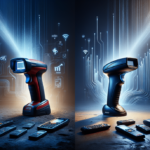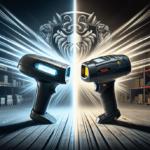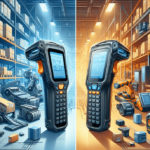Zebra DS2208 vs Honeywell Granit 1911i: Comprehensive Comparison
When selecting a mobile scanning solution, Zebra and Honeywell emerge as two of the most trusted names in the industry. This comparison delves into their flagship handheld scanners: the Zebra DS2208 and the Honeywell Granit 1911i, evaluating their features, performance, and suitability for various industries.
Physical Features: Design, Size, and Portability
The Zebra DS2208 and Honeywell Granit 1911i are designed with different environments in mind, reflected in their physical attributes:
- Zebra DS2208: Compact dimensions of 6.5 x 2.6 x 3.9 inches and a lightweight build of 5.9 ounces make it highly portable, ideal for retail settings where mobility is essential.
- Honeywell Granit 1911i: Larger and more robust, measuring 7.5 x 2.8 x 5.2 inches and weighing 13.6 ounces, it is built to withstand the rigors of industrial environments.
Both scanners feature ergonomic designs to reduce user fatigue during prolonged use. The DS2208's bright LED aimer facilitates accurate scanning in various lighting conditions, while the Granit 1911i's rugged exterior ensures longevity in harsh settings.
Performance Metrics: Scanning Speed, Accuracy, and Range
Performance is a critical factor in the effectiveness of handheld scanners:
- Zebra DS2208: Delivers up to 240 scans per second with a scanning range of up to 25 inches. Its ability to read both 1D and 2D barcodes with high accuracy makes it suitable for fast-paced retail environments.
- Honeywell Granit 1911i: Offers a scanning range of up to 50 feet and a speed of 50 scans per second. It excels in reading damaged or poorly printed barcodes, which is essential in industrial settings where barcode quality can be inconsistent.
According to a Statista report, the demand for high-performance barcode scanners has increased by 15% annually, highlighting the importance of speed and accuracy in operational efficiency.
Connectivity Options: Wired vs Wireless
Integrating scanners into existing systems requires versatile connectivity options:
- Zebra DS2208: Supports USB, Bluetooth, and NFC, providing flexibility for various connection needs.
- Honeywell Granit 1911i: Expands connectivity with USB, Bluetooth, and Wi-Fi, enhancing its suitability for large-scale operations like warehouses.
Wi-Fi connectivity in the Granit 1911i allows for seamless integration into expansive facilities, reducing latency and improving data transmission reliability. In contrast, the DS2208's Bluetooth and NFC offer reliable wireless options with lower power consumption.
Choosing the right connectivity depends on the specific needs of your business. Wired connections offer stability and security, while wireless options provide mobility and ease of use.
Durability and Battery Life: Built to Last
Both scanners are built for durability, but they cater to different environments:
- Zebra DS2208: Can withstand drops from up to 5 feet, making it suitable for everyday use in retail. It features a rechargeable Lithium-Ion battery lasting up to 14 hours, with a charging time of approximately 2.5 hours.
- Honeywell Granit 1911i: Superior durability with an IP65 rating for dust and water resistance and the ability to endure drops from up to 6.5 feet. Its removable Lithium-Ion battery also offers up to 14 hours of usage, with an extended option available for prolonged operations.
According to Forbes, advancements in battery technology have significantly improved the operational downtime, making modern scanners more reliable for continuous use.
Pricing and Value: Cost-Benefit Analysis
Pricing is a crucial consideration when selecting a scanner:
- Zebra DS2208: Priced around $170, it offers an affordable solution for small to medium-sized businesses without compromising on reliability and performance.
- Honeywell Granit 1911i: With a price point typically above $700, it reflects its enhanced durability, extended battery life, and advanced scanning capabilities. The Granit 1911i also includes a three-year warranty, providing long-term value and reducing maintenance costs.
When evaluating value for money, consider the total cost of ownership, including durability, warranty, and potential replacement or repair costs. Businesses operating in demanding environments may find the initial higher investment in the Granit 1911i justified by its longevity and performance.
User Experience and Reviews: Real-World Feedback
Feedback from users highlights the strengths and areas for improvement for both scanners:
- Zebra DS2208: Users praise its accuracy, scanning speed, and cost-effectiveness. Its seamless integration into retail systems and lightweight design are frequently mentioned advantages.
- Honeywell Granit 1911i: Reviews emphasize its exceptional durability and versatile scanning capabilities. Users appreciate its reliability in challenging environments and extended battery life, though some note the setup process can be more complex compared to the DS2208.
Overall, both scanners receive positive reviews, with the DS2208 favored for its simplicity and affordability, and the Granit 1911i for its robustness and advanced features.
Industry Applications: Tailoring to Your Business Needs
Choosing the right scanner depends on your industry's specific requirements:
- Retail, Healthcare, Hospitality: The Zebra DS2208 is optimal due to its affordability, ease of use, and reliable performance in environments where speed and accuracy are essential.
- Manufacturing, Logistics, Warehousing: The Honeywell Granit 1911i excels with its rugged design, extended scanning range, and durability, making it ideal for demanding settings where equipment is subject to harsh conditions.
Conclusion: Making the Right Choice for Your Business
Both the Zebra DS2208 and Honeywell Granit 1911i are exceptional handheld barcode scanners, each catering to distinct needs:
- Zebra DS2208: Best suited for businesses seeking an affordable, reliable scanner for general use, particularly in retail, healthcare, and hospitality industries.
- Honeywell Granit 1911i: Ideal for environments that demand ruggedness and durability, such as manufacturing, logistics, and warehousing.
Your decision should be guided by your specific operational requirements, budget, and the environment in which the scanner will be used. Both Zebra and Honeywell offer proven quality and durability, ensuring that whichever scanner you choose will effectively meet your business's scanning needs.
Additional Resources
- Zebra DS2208 Product Page
- Honeywell Granit 1911i Product Page
- Zebra Barcode Scanners Overview
- Honeywell Barcode Scanners






















